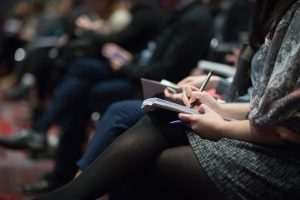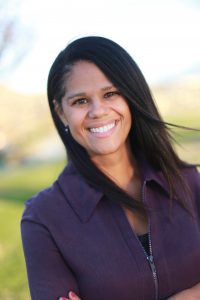The weekend of August 8-12, thousands of psychologists converged on the Moscone Center in San Francisco. We crowded the airports, hotels and the downtown restaurants. Poster tubes hung on the shoulders of what seemed like every other person passed by. (Fortunately, I’d used Spoonflower.com to print my FABRIC poster, so I was feeling pretty breezy walking around without that worry!) But, it did feel kind of strange knowing that every other person I walked by was likely a psychologist of some sort (health psychologist, neuropsychologist, developmental psychologist, clinical psychologist…you get the idea).
The excitement on the first day of the convention was palpable. Researchers readied to present their posters, presenters clipped on mics and the new APA presidential hopefuls passed out badges and literature around every corner.

Did you say Bryan Stevenson?
For me, the highlight of the convention was sitting in sessions and listening to well-known psychologists speak about their research and passions. Bryan Stevenson (attorney and author of Just Mercy….you’ve got to read it), provided the keynote address. (Can I say that I was doing a bit of “fan-girling” when I heard!)
AND Aaron Beck?
I’ve put together some quotes from the sessions I attended with some of these amazing people. To see them in person and hear directly from them was a great honor–especially since I teach about their work every semester. Here are some highlights:
Aaron Beck (Cognitive Therapy/Cognitive Behavioral Therapy developer). First of all, did you know that he goes by “Tem” (from his middle name Temkin)? At 97 years old he continues to research and write. He’s currently researching cognitive interventions for individuals with Schizophrenia. He was asked how many more years he’ll plan to do a video conference for the APA convention. He said, “I plan to do it for the next three years. After that, I’ll re-evaluate.” He’ll be 100 at that time!
Jon Kabat-Zinn – (Mindfulness Based-Stress Reduction developer). When asked about his approach, he said, “Mindfulness is not a therapy, it is a way of being.” He also stated, “Healing is not fixing but coming to terms with things as they are.”
Brad Bushman (previous member of President Obama’s committee on gun violence and researcher on violence and aggression). When speaking of media violence (tv, video games, etc) and its impact on kids and teens he said, “How can kids do something 7.5 hours per day and not be influenced by it?” He stated that he’s found, “When parents provide limits to media exposure, it decreases aggressive behavior.” He notes that he gets hate mail from teens about these assertions all the time! For example, “Video games don’t make me want to be violent but you do!”
Patricia Deegan (a major influencer of the mental health recovery movement and developer of the Schizophrenia “Hearing Voices” simulation). For people with Schizophrenia (and other sufferers of mental health issues), she encourages figuring out what your “personal medicine” is – things that we do that “put a smile on our face” and can potentially help decrease symptoms. For example, your personal medicine could be playing an instrument, petting a dog or gardening.
James Garbarino (researcher in child and adolescent development, particularly juvenile delinquency and childhood aggression). According to his research, the average number of Adverse Childhood Experiences (ACES) for teen killers is 7+ out of 10. For the average American youth, the average is 1-2.
Next year the APA Convention will be in Chicago, IL. Want to go?

Dr. Veola Vazquez is a licensed psychologist and a professor of psychology at California Baptist University. To find out more about her ongoing research, check out her Culture and Character Lab.